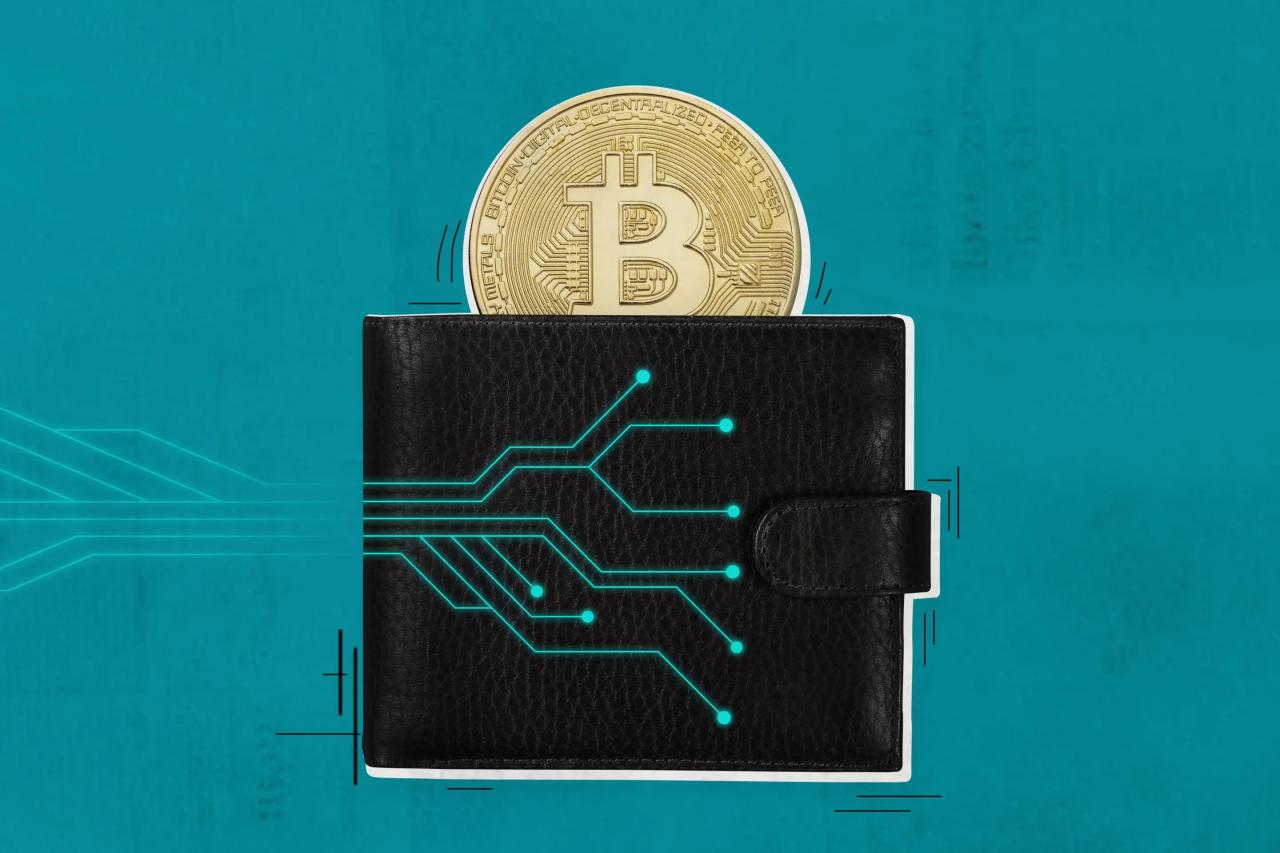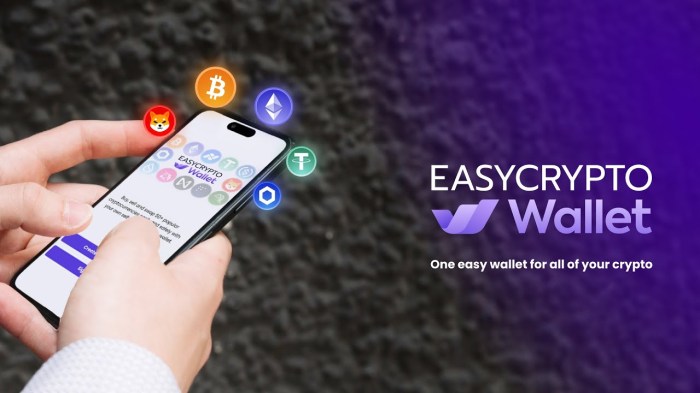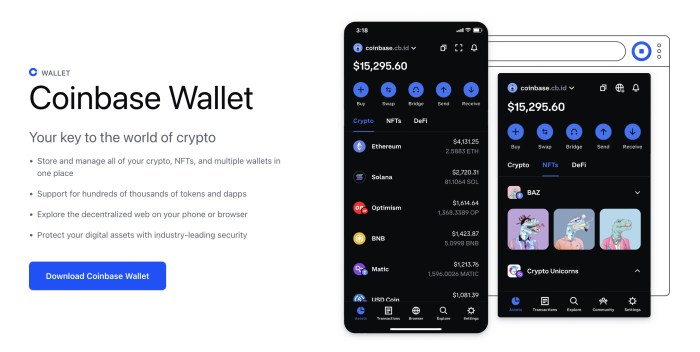Crypto Wallet: Understanding the intricacies of crypto wallets is crucial in today’s digital landscape. These secure digital containers hold your cryptocurrency, offering varying levels of security and accessibility. Choosing the right wallet depends heavily on individual needs, ranging from simple storage to complex trading strategies. This exploration delves into the functionality, security considerations, and diverse types of crypto wallets available.
<script async="async" data-cfasync="false" src="//pl27571810.revenuecpmgate.com/5b695ee9e17a297f791ef052f96b968a/invoke.js"></script> <div id="container-5b695ee9e17a297f791ef052f96b968a"></div>
Different crypto wallets cater to different user needs and levels of technical expertise. Hardware wallets offer the highest security, keeping your private keys offline and protected from hacking attempts. Software wallets, while more convenient, require extra vigilance to safeguard against online threats. Understanding the trade-offs between security and usability is paramount when selecting a crypto wallet.
In the burgeoning world of cryptocurrency, a crypto wallet is your indispensable tool for managing and securing your digital assets. It’s not a physical wallet, but rather a software or hardware program that stores your private keys, which are essential for accessing and transacting with your cryptocurrencies. Choosing the right wallet is crucial, as it directly impacts the security and usability of your investments.
This comprehensive guide will delve into the intricacies of crypto wallets, helping you navigate the landscape and make informed decisions.
Types of Crypto Wallets: A Detailed Overview
Crypto wallets come in various forms, each with its own strengths and weaknesses. Understanding these differences is key to selecting the best option for your needs and technical expertise.
1. Software Wallets
Accessibility and Convenience
Software wallets are applications installed on your computer (desktop wallets) or mobile device (mobile wallets). They offer ease of use and accessibility, making them popular among beginners. However, they are susceptible to malware and hacking if not properly secured.
- Desktop Wallets: Offer more advanced features and greater control over your funds, but require a reliable and secure computer.
- Mobile Wallets: Convenient for everyday transactions, but potentially vulnerable to phone loss or theft.
- Web Wallets: Accessed through a web browser, offering convenience but potentially compromising security due to reliance on third-party platforms. Examples include exchanges that offer wallet services.
2. Hardware Wallets
The Pinnacle of Security
Hardware wallets are physical devices resembling USB drives that store your private keys offline. They provide the highest level of security, protecting your assets from online threats like malware and phishing attacks. While more expensive than software wallets, the enhanced security is often worth the investment for significant holdings.
- Ledger and Trezor: Two of the most popular and reputable hardware wallet brands, known for their robust security features and user-friendly interfaces.
3. Paper Wallets
Offline Storage for Long-Term Holding
Paper wallets involve printing your public and private keys onto paper. This offline method offers excellent security against online threats, ideal for long-term storage of cryptocurrency. However, they are susceptible to physical damage and loss.
4. Multi-Signature Wallets
Enhanced Security Through Collaboration
Multi-signature wallets require multiple approvals for transactions, enhancing security by preventing unauthorized access even if one private key is compromised. This is a popular choice for businesses and individuals managing large sums of cryptocurrency.

Choosing the Right Crypto Wallet: Factors to Consider
Selecting the appropriate crypto wallet involves careful consideration of several factors:
- Security: Prioritize wallets with strong security features, especially if you hold significant amounts of cryptocurrency. Hardware wallets generally offer the best security.
- Ease of Use: Consider your technical skills and choose a wallet with an intuitive interface. Beginner-friendly options are available for those new to crypto.
- Supported Cryptocurrencies: Ensure the wallet supports the specific cryptocurrencies you intend to store. Some wallets only support a limited range of coins and tokens.
- Fees: Some wallets charge transaction fees, while others may have associated costs for certain features. Compare fees across different wallets before making a decision.
- Customer Support: Reliable customer support is crucial in case of issues or questions. Check the wallet provider’s reputation and support channels.
- Backup and Recovery: Understand the backup and recovery procedures for your chosen wallet. Losing access to your private keys can result in irreversible loss of funds.
Security Best Practices for Crypto Wallets
Protecting your crypto assets requires diligent adherence to security best practices:

- Strong Passwords: Use strong, unique passwords for all your wallets and avoid reusing passwords across different platforms.
- Two-Factor Authentication (2FA): Enable 2FA whenever possible to add an extra layer of security.
- Regular Software Updates: Keep your software wallets updated to benefit from the latest security patches.
- Antivirus Software: Use reputable antivirus software on your computer to protect against malware.
- Beware of Phishing Scams: Be cautious of suspicious emails or websites that may attempt to steal your private keys.
- Offline Storage for Private Keys: For enhanced security, store your private keys offline, especially for large amounts of cryptocurrency.
Frequently Asked Questions (FAQ)
- Q: What is a seed phrase?
A: A seed phrase (also known as a recovery phrase) is a list of words that allows you to restore access to your cryptocurrency wallet if you lose your device or forget your password. Keep it safe and secure, offline. - Q: Are crypto wallets insured?
A: Most crypto wallets are not insured against theft or loss. The responsibility for securing your assets lies with you. - Q: Which wallet is best for beginners?
A: Many user-friendly mobile wallets are suitable for beginners. However, research is crucial to find a wallet that fits your needs and risk tolerance. - Q: How do I choose a cryptocurrency exchange that offers secure wallet services?
A: Research the exchange’s security measures, reputation, and customer reviews before storing your cryptocurrency on their platform. Look for features like two-factor authentication and cold storage for assets. - Q: What is the difference between a hot wallet and a cold wallet?
A: A hot wallet is connected to the internet, offering convenience but increased vulnerability. A cold wallet is offline, offering superior security but reduced accessibility. - Q: What should I do if I lose my private keys?
A: If you lose your private keys without a backup, you will likely lose access to your cryptocurrency. This highlights the critical importance of secure backups and recovery procedures.
Conclusion
Choosing and managing a crypto wallet is a crucial aspect of participating in the cryptocurrency ecosystem. By understanding the different types of wallets, security considerations, and best practices, you can safeguard your digital assets and enjoy the benefits of cryptocurrency with confidence. Remember, security is paramount. Always prioritize the security of your private keys above convenience.

References: Crypto Wallet
Call to Action
Ready to take control of your cryptocurrency? Research and choose the crypto wallet that best suits your needs and security preferences. Start exploring the world of digital assets today!
Key Questions Answered
What is a seed phrase and why is it important?
A seed phrase is a list of words that acts as a backup for your crypto wallet. It allows you to recover your wallet and access your funds if your device is lost or damaged. Keeping it safe and secure is absolutely critical.
How do I choose the right crypto wallet for me?
Consider your technical skills, the amount of cryptocurrency you hold, and your security preferences. Beginners might prefer user-friendly software wallets, while experienced users may opt for hardware wallets for enhanced security.
Are crypto wallets insured?
Most crypto wallets are not insured in the same way traditional bank accounts are. The responsibility for securing your funds rests primarily with the user.



